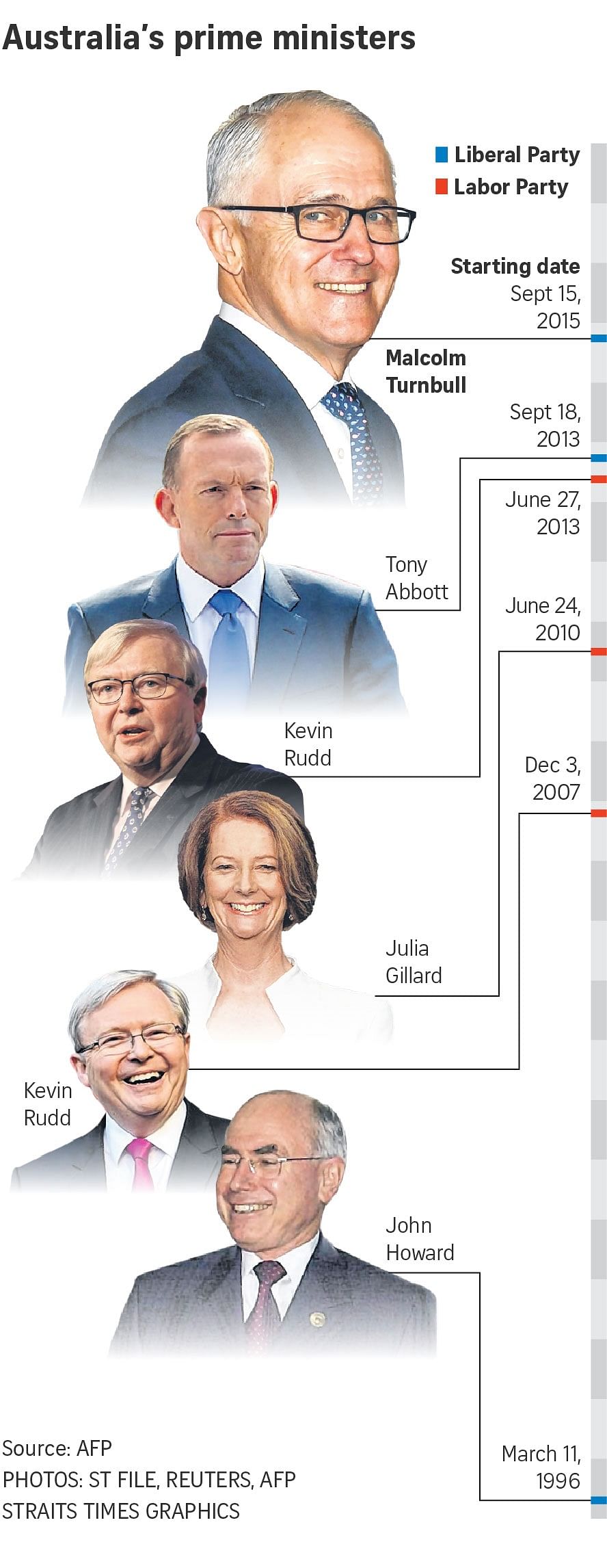Australia braces for showdown to decide new PM
Sign up now: Get insights on Asia's fast-moving developments
Follow topic:
SYDNEY - Australia's Prime Minister, Mr Malcolm Turnbull, is expected to be forced to resign on Friday (Aug 24), paving the way for a three-way leadership contest to end days of furious infighting in the ruling Liberal party.
As the chaos in Canberra continued on Thursday night, three leadership contenders emerged: Foreign Minister Julie Bishop, Treasurer Scott Morrison and former Home Affairs Minister Peter Dutton, a hardliner who lost by a narrow margin in a party room challenge to Mr Turnbull on Tuesday. The vote was 48-35.
Saying the nation was "appalled" by his party's political turmoil, Mr Turnbull vowed to resign if a majority of Liberal MPs demanded another leadership vote. The vote would then be held today at midday, local time.
"Australians will be rightly appalled by what they're witnessing in their nation's Parliament today and in the course of this week," he said yesterday (Thurs).
A petition was circulating on Thursday night among Liberal MPs which was expected to result in a fresh leadership ballot and ensure Mr Turnbull's demise. The petition needs 43 signatures. Liberal MP Karen Andrews said on Thursday night the petition already had 42 and The Australian daily said one more was expected by Friday morning.
Lashing out at a group of rebel right-wing MPs and some media commentators who have encouraged this week's putsch, Mr Turnbull described the insurrection as a "form of madness".
"The reality is that a minority in the party room, supported by others outside the Parliament, have sought to bully, intimidate others into making this change of leadership that they're seeking," he said.
The ballot would set up a likely battle between Mr Dutton, a hardliner, and Mr Morrison and Ms Bishop, who are considered more moderate. The situation remains fluid and contenders could yet drop out if they think they cannot win.
But the new leader will likely struggle to heal the divisions that have torn the party apart.
Thirteen ministers have resigned following Tuesday's ballot, including figures thought to be close to Mr Turnbull, such as Finance Minister Mathias Cormann.
The ruling Liberal-National Coalition has long trailed Labor in the opinion polls and appears likely to lose the next election, due by May. A new leader will come under heavy pressure to call an early general election to seek a fresh mandate.
The events this week have been less about policy than politics and personalities.
Mr Turnbull, a former investment banker, is mistrusted by conservatives in the party and regarded as a progressive despite shedding many of his more liberal views on issues such as climate change and same-sex marriage.
But he failed to placate the party's right-wing MPs, who have not forgiven him for toppling former leader Tony Abbott in 2015. Mr Abbott remains a backbencher and has vocally criticised Mr Turnbull's leadership.

Mr Dutton, a former policeman, is the preferred candidate of the right wing and has signalled he would introduce curbs on immigration and tougher law and order policies.
But, to add to the chaos, there are questions over whether Mr Dutton is eligible to be an MP because his family's childcare business has received government funding.
Australia's Solicitor-General has been asked to rule by Friday (Aug 24) on whether Mr Dutton is barred by the constitution from being an MP.
The turmoil on Thursday resulted in bizarre scenes, as the Coalition adjourned Parliament's Lower House to try to sort out its leadership mess.
Labor leader Bill Shorten told the chamber that "Australia no longer has a functioning government".
Australia has a strong economy and relatively low unemployment but has endured political chaos in recent years.
No leader has served a full term since John Howard after the 2004 election. Since then, every leader - Labor's Kevin Rudd and Julia Gillard and the Liberal's Tony Abbott - has been dumped by their party.
The run of recent coups has fuelled expectations that leaders whose parties trail in the opinion surveys are doomed. And the coups produce unelected prime ministers, who lack a mandate from the public and lead a party that will inevitably be riven by recrimination and internal feuds. The next leader will struggle to unite the party, let alone win an election.

